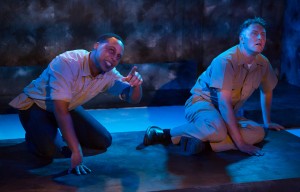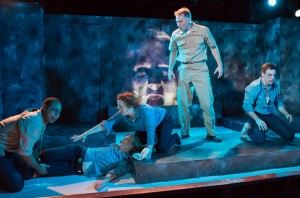Michelle Kholos Brooks writes powerful dramas about salient issues. Together with director Sarah Norris, she has created a viscerally, emotionally gripping tableau of remembrance. With maximum impact, Kholos Brooks’s Room 1214 hits gun violence out of the ballpark.
The Greatest Hits Down Route 66
Histories come in all shapes and sizes and can be chronicled in any number of fashions. Family histories, each unhappy in their own way, may reveal personal pains that turn out to be strikingly universal. A country’s history can be told in terms of its politics, its geographic landmarks, its immigrants. And a people’s history can be reflected in its folk music. Any one of these might make for an engrossing night of theater. But when attempting to combine all three, finding the right balance and weaving a cohesive tale become a tall order. Such is the case with the New Light Theater Project’s production of The Greatest Hits Down Route 66, which finds itself short on songs, long on family dysfunction, and scattered on Americana.
War Words
War Words, assembled by Michelle Kholos Brooks from the words of some dozen veterans of the Iraq and Afghanistan Wars, is simplicity itself, and all the stronger for it. The show thrusts the audience into combat and its devastating aftereffects. You may quibble here and there with the presentation and the choices of what’s included and what isn’t, but it’s unlikely that you’ll leave A.R.T./New York unmoved.
The Lights Are On
In addition to crafting an engrossing thriller, dramatist Owen Panettieri shows a gift for prognostication with The Lights Are On. He wrote the play before the pandemic—it had been set for a fall opening in 2020 when COVID shut down all theater—yet it has a character who hoards toilet paper and face masks, wipes down the groceries and stays home all the time.
H*tler’s Tasters
Much about Adolf Hitler was incongruous. Infatuated with his own greatness and that of the “Fatherland,” he pontificated about Aryan superiority, order, and sacrifice, yet his life was chaotic, fueled by anger and drug-induced delusions; he was obsessive and paranoid. In H*tler’s Tasters, playwright Michelle Kholos Brooks has brilliantly adapted the true story of 15 women who were employed to taste the paranoid leader’s food. It’s a timely drama with dark humor and music.
Everything Is Super Great
Stephen Brown’s Everything Is Super Great presents a group of likable, oddball, and somewhat hapless characters who don’t really fit in anywhere in the suburban Texas world they inhabit, but bond with one another amid unexpected circumstances. The word “great” works in the play as a form of deliberate denial, but also something genuinely hopeful: life is a series of vexations, large and small, for everyone on stage, and yet the characters, and the play itself, search for little moments of meaning and connection.
Hal & Bee
As inspirations go, the combination of Who’s Afraid of Virginia Woolf? and The Secret Life of Walter Mitty is certainly an odd one, yet those sources are echoed in Max Baker’s charming, offbeat comedy Hal & Bee.
Nightmare on the High Seas
If art is about digging beneath the surfaces of things and restoring wholeness to human experience, run to see In The Soundless Awe, an important new play by Jayme McGhan and Andy Pederson now playing at Access Theater until Dec. 12. One of three plays in repertory with the New Light Theater Project (NLTP), it is beautifully produced and imaginatively directed by Sarah Norris, a founding artistic director of the NLTP company.
At the heart of the play is Captain Charles Butler McVay III, a highly decorated third generation Navy officer and the commander of the U.S.S. Indianapolis when two Japanese torpedoes struck it just after midnight on July 30, 1945. Three hundred men were killed in the first 12 minutes it took the ship to sink. Over the next five days, 900 more languished unsheltered on the high seas fighting sun, sharks, dehydration, starvation and exhaustion while anticipating rescue any minute. Three SOS signals had been sent as the ship went down but 600 more men would die before survivors were accidentally sighted by pilots on a routine patrol and rescued. It was the largest loss of life in U.S. naval history. McVay was court-martialed and found guilty of “failing to zigzag,” a way of steering to avoid enemy fire, although this maneuver was technically at the discretion of the commanding officer (himself).
How does one plumb such an experience: five days, 900 men and the mothers, fathers, wives and children forever caught in its vast net? This might have been a play about a Navy cover-up: its failure to provide standard destroyer escort for the ship (although six days earlier a destroyer was similarly torpedoed on the same route); and its mangled rescue operation that inexcusably left 900 men in the cold Pacific waters for five interminable days. But In The Soundless Awe is less about events—a sinking, court martial and suicide—than about an experience that is simply beyond the ability of the mind to grasp. What do we do with such an experience? What does it look like? What are its consequences for the survivors? For the families of those who did not survive? And for our navy and military, which in deflecting blame to one of its own, set the stage, the writers imply, for cover-ups to come in Vietnam and elsewhere. For us?
This is a deftly written and ambitious script that zigzags back and forth in real-time, in remembered time and in imagined time not so much as a way to tell us a story as to imitate the flow of mind itself in its perpetual return to the frozen moment, to the five days on the high seas which will forever imprison those who lived through it. On stage the bodies of the actors freeze and unfreeze as they play out the bits and pieces of this terrible scene: attempts of the Captain and his crew to distract themselves, delusions of help on a horizon, sharing the little water they had, discovering that a mate has lost a leg to a shark, the dying of the men one by one. A suggestive and repeating motif, the Gray Lady (Hallie Wage), a beautiful and tempting siren of death and release, pulls the dying off stage but also dances with McVay. The Captain imagines a meeting with his stern and distant father and plays cards with friends years after his court martial, but his mind always returns to those five days on the water until he steps out of time itself by raising a gun to his head.
The actors work in a theatrical style in which choreographed movement and gesture, video, lighting and sound matter as much as, or even more, than the words spoken. A stage direction includes a note: “nightmarish and Kafkaesque,” but so much more in the production is not in the script—the eerie blue light that bathes the stage when we first enter the theater; video clips noting each day on the water and how many men are still living. Phantasmagoria and metaphor are the keys to the excavation of the inner world of McVay, but also to a shared human interior. The creative direction of Norris and her brilliant creative and production team deepen the script and give the play its juice and strange beauty. The ensemble, who take on a variety of roles, are outstanding. The two actors who play McVay as a young man and as an old man, Chris Kipiniak and Leo Farley, are convincing.
In The Soundless Awe is a well-executed, well-conceived and beautifully produced play. What makes it important is that it enlarges the violated human dimension of a terrible event in our shared American history. It opens our hearts and imagination to the wartime experience of men who sacrificed for our common welfare.
In Soundless Awe” runs until Dec. 12 at Access Theater (380 Broadway, 4th Floor, between White and Walker Sts.) in lower Manhattan. Performances run Thursday-Saturday at 8 p.m. Check NewLightTheaterProject.com for the exact schedule. Tickets are $15 and can be purchased by calling 800-838-3006 or visiting BrownPaperTickets.com. Limited blocks of free and discount tickets for veterans or active-duty personnel are available. Inquire at NewLightTheaterProject@gmail.com.















